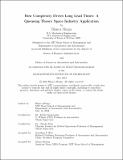How Complexity Drives Long Lead Times: A Queueing Theory Space Industry Application
Author(s)
Murga, Blanca
DownloadThesis PDF (6.484Mb)
Advisor
Fine, Charles
Spakovszky, Zoltán
Terms of use
Metadata
Show full item recordAbstract
The space industry is going through a major transformation. In today’s space industry, commercial companies compete in the market for customers and resources; no longer the exclusive domain of government agencies and legacy aerospace giants. Companies are forced to develop new technology and find ways to reduce costs in ways not seen before. A major challenge for the industry is to produce complex reusable systems at higher rates and lower costs.
Many aerospace companies produce their components in high-mix, low-volume operations known as job shops. Job shops are notorious for having long lead times. The research for this thesis was conducted at a manufacturing site at Blue Origin, a privately held space company, that operates as a job shop. The purpose was to identify the sources for the long lead times observed in the production of machined components.
The hypothesis the thesis investigates is that long lead times are the result of high variability caused by the complexity of producing space components. Using the method proposed by Factory Physics and queueing theory, this thesis demonstrates via case studies and a queueing simulation that high variability drives long wait times leading to the long lead times experienced in job shop operations.
Date issued
2024-05Department
Massachusetts Institute of Technology. Department of Aeronautics and Astronautics; Sloan School of ManagementPublisher
Massachusetts Institute of Technology